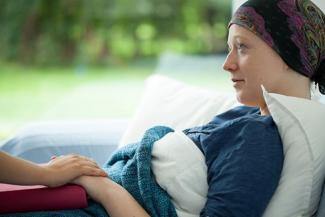
Pranab Kumar Basu has turned a counsellor after being a full-time caregiver to his wife who was suffering from Cancer. He discusses his experiences of supporting cancer patients who are apprehensive about hair loss.
In your experience, who suffer more hair loss after chemotherapy: men or women?
Hair loss occurs in both men and women but in respect of volume women suffer more hair loss.
For whom is it more traumatic: men or women? Is there an age profile that is affected more?
It is more traumatic for women who usually take more pride in their hair. Young women(20yrs - 45yrs) feel the loss and trauma more than their elderly counterparts, those above 50.
Read: My wife has to tolerate the side effects of chemotherapy
Do people refuse to go ahead with treatment due to fear of hair loss?
There are one or two cases where that has actually happened. I know a young, beautiful woman, who was only 34 years old who first vehemently opposed chemotherapy thinking that she would look ugly because of the resultant hair loss. She eventually went ahead with chemotherapy, but after much delay.
What kind of hair loss is it usually - thinning or complete balding?
Thinning or balding depends on the kind or duration of chemotherapy administered.
Is there hair loss only in the scalp or in other parts of the body as well?
Chemotherapy treatment causes hair loss all over body, not just on one's scalp. Sometimes eyelashes, eyebrows, armpit hair, pubic hair and other body hair fall out along with hair on the scalp.
What is your advice to such patients?
- Don't get upset.
- Hair grows back within 2/3 months after the completion of chemotherapy.
- This side effect shows positive sign that chemo drug is responding well,and you are going to be cured.
- If you feel uneasy, you can use a hair net at night to keep the hair from coming out in clumps. You can use a wig or a scarf when stepping while stepping out of home. You can also use cooling caps (scalp hypothermia) to reduce hair loss.
- Recovery from the illness must be your top priority, ignoring the hair loss which will be replaced in due time.
- Please do concentrate on the other side effects of chemotherapy like nausea,diarrhoea and follow the advice of the oncologist to tackle those.
Is hair loss a big issue which you have to address as a counsellor? If so why?
Hair loss is one of the issues. As counsellors, we help the patients realize that it is not a big issue and to accept the temporary loss which is repairable and compensated.
I advise patients to shave when the hair fall starts. I also show them the positive side of it, the positive side being that falling hair can scatter everywhere, including the food that one eats. This can cause a stomach infection. So it is better to shave off to avoid that.
Read: Coping With Hair Loss During Chemotherapy
In your experience have you encountered patients undergoing chemotherapy but not experiencing hair fall?
Yes. My wife with colon cancer (metastatic) didn't experience hair loss while undergoing CapOX 8cycles and capecita bine500(5/6 tab daily)8 cycles. When she was put on FOLFIRI,she lost 2/3 of her hair. I told her to cut the hair short to restrict the scattering of hair,a high risk while taking meals. At the time of her death, her scalp was full of hair which had grown back.
Does hair grow back fully after chemotherapy?
Yes, hair grows back almost fully after chemotherapy depending on other factors.
Can you share a few examples of how people react to the side effect of hair loss?
- I knew a lady,68, with breast cancer. Due to chemotherapy, her beautiful long hair was thinning out and finally she turned bald. She would get very annoyed when she looked into the mirror.
- Nita, 55, was a patient under palliative care.She was detected with breast cancer and she refused to undergo chemotherapy at first. She knew she might go bald, but was later counselled into understanding the importance of chemotherapy.
- Another patient, Barun,58, also refused to go for chemotherapy for the same reason. Again he had to be counselled before he was convinced.
- Another interesting case is that of a tribal woman with breast cancer( metastatic) now under palliative care treatment. When I first met her I was amazed at her mental strength and the struggle she was going through. .She is an agricultural labourer who concealed her condition from her village people who would unfortunately drive her out if they came to know of it, such was the mindset. She works in the agricultural field covering her bald head with a saree. Her resilience is truly an inspiration for all those suffering from Cancer.
As counsellors, we like to see the mental spirit and smiles on the face of a patient.
Mr Pranab Kumar Basu, retd Asst. Headmaster and currently voluntary counsellor to cancer patients at Eastern India Palliative Care, Barrackpore, West Bengal






